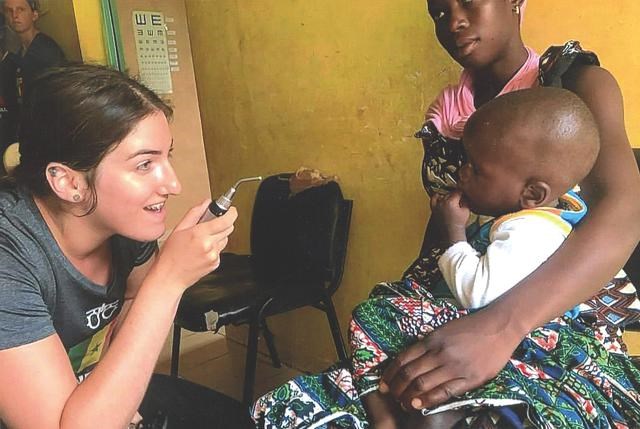Weyburn student Tristyn Lautner had “an unbelievable experience” as part of a team of optometry students from the University of Waterloo, who traveled this summer to Senegal to provide free eye care to impoverished residents there.
Tristyn, the daughter of Barry and Freda Lautner of Weyburn, is halfway through her four-year optometry program at the university, and as students going on this trip had to raise their own expenses, she received a grant from the Weyburn Rotary Club to help her be able to take part. She provided a report and some photos from her trip, so the club members could find out what help her group was able to provide.
The mission trip was with the Waterloo chapter of Volunteer Optometric Services to Humanity (VOSH), which is an international agency whose mandate is to facilitate the provision and sustainability of vision care worldwide to people who can neither afford nor obtain such care.
VOSH Waterloo is a not-for-profit organization that has been in operation since 1971. Dedicated volunteers provide optometric care in the form of ocular health checks and eyewear in developing countries. Each clinic lasts between seven and 10 days, and 400-700 patients are typically seen per day. Each year, Waterloo optometry students and practicing optometrists collaborate with other North American VOSH chapters to embark on mission trips around the world.
Tristyn’s team visited two health posts on their trip to Senegal, at Bandafassi and Ethiolo, and held a total of six clinic days. During this time, they saw 755 patients.
“We had a slower flow of patients than most VOSH clinics, so we were able to take our time with each patient, getting to know each person, and providing them with the best care we could offer,” said Tristyn, noting their team had two optometrists along with them to provide guidance and help.
“They were the best mentors we could have asked for. They pushed us to use our clinical skills and reasoning every single day,” she said of the two doctors.
Overall, the group felt the Senegalese people had very good eye health, but there were some eye conditions they needed to address, and families they could help out. Some of the most common conditions they encountered were pterygia and early onset cataracts, and they referred a total of 46 patients for cataract surgery.
Tristyn noted that both of these conditions are caused by excessive sun exposure, and sunglasses were given to nearly every person who came to the clinic, a total of 750 pairs, along with 400 pairs of reading glasses and 300 pairs of prescription distance glasses.
Some of the more serious eye conditions they saw were trachoma, corneal scarring, complications of trauma, keratoconus, hypertensive retinopathy and macular degeneration.
“The most concerning cases were those of active trachoma, which can lead to blindness if left untreated. We treated these cases with oral and topical antibiotics, and educated parents on how to recognize the signs and symptoms of the active disease,” said Tristyn. “This opportunity was such a valuable learning experience.”
There were some fun experiences as well while they visited Senegal.
“Our group was able to go on a safari, try out surfing for the first time, take a Senegalese dance lesson, get clothing made at the local markets, and sample plenty of Senegalese cuisine. Having a mix of work and play made this trip even more memorable,” said Tristyn, who thanked the club for helping her to have “this unbelievable experience.”
“I learned so much from being able to use my clinical skills, and I can’t wait to go on a similar trip in the future,” she added.
Tristyn noted that she has posted several photos from her trip on her Facebook account under “Tristyn Marie”.



